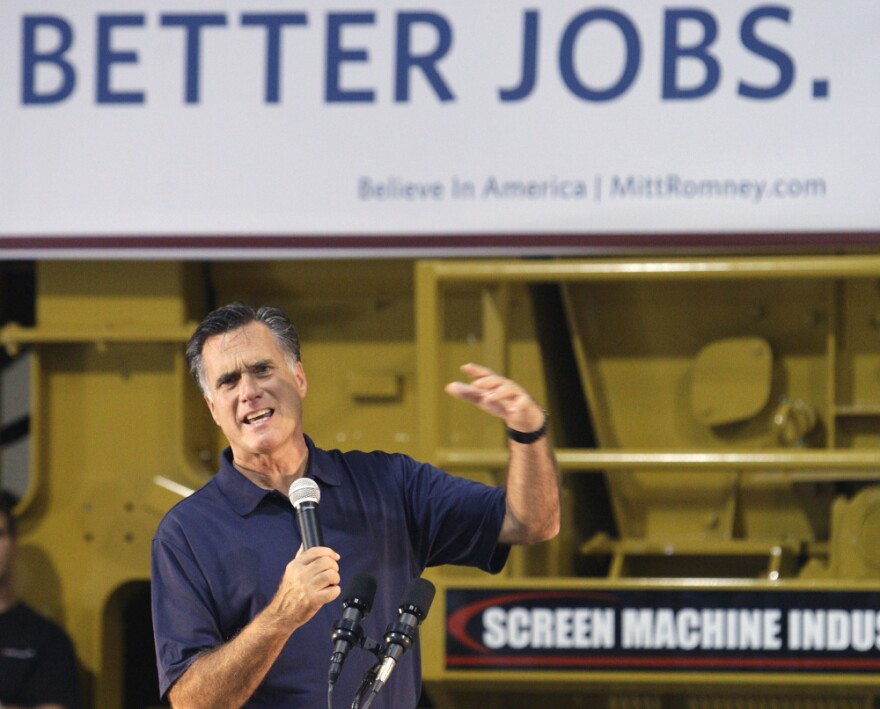For the Republicans vying to replace President Obama, the debate on the campaign trail has taken a back seat to the debate in Washington.
Among the GOP presidential hopefuls, the dominant position on the deal is thumbs-down, though some reluctantly supported the agreement.
Ultimately, what may seem a short-term solution, in my mind, is going to guarantee a long-term financial ruin for the country.
But now, the issue of federal spending promises to become one of the leading topics of discussion as voters size up the Republican field.
Let's start with two of the Republicans in the field who actually got to vote on the deal: Reps. Michele Bachmann of Minnesota and Ron Paul of Texas. Both were emphatic no's. Speaking on Fox News Radio, Bachmann likened the level of U.S. debt to the fiscal calamity that has gripped some European countries.
"This is like saying we embrace being Greece," she said.
Program host Laura Ingraham, herself a staunch conservative, pressed Bachmann, arguing that this was the best deal possible in a divided government, and while far from perfect, it should be embraced.
"How is it that you can't say that this is actually, ultimately a good thing? Not everything," Ingraham said, "but it's a good thing, and it's a good step forward. That I don't understand. I just still don't get it."
"Ultimately," Bachmann replied, "what may seem a short-term solution, in my mind, is going to guarantee a long-term financial ruin for the country."
As for Ron Paul, an ad on his campaign website asks: "Will our party's leaders repeat the mistakes of the past? Will they choose compromise or conviction? One candidate has always been true: Ron Paul. Cut spending. Balance the budget. No deals."
One candidate supporting the deal is former U.S House Speaker Newt Gingrich. Monday on Fox News, he said he's not going to second-guess current Speaker John Boehner, adding that the Tea Party and all conservatives should claim victory.
"We just had an extraordinary moment, where a very left-wing president blinked," he said.
Only one other GOP candidate embraced the deal — former Utah Gov. Jon Huntsman. Other no's are former Minnesota Gov. Tim Pawlenty, businessman Herman Cain, former Pennsylvania Sen. Rick Santorum, Texas Gov. Rick Perry — who is not quite a candidate yet — and former Massachusetts Gov. Mitt Romney.
Romney's position had been the subject of considerable speculation due to his own history as head of an investment firm and his close ties to Wall Street, which badly wanted a deal.
In his short statement, Romney said he appreciates "the extraordinarily difficult situation President Obama's lack of leadership has placed Republican members of Congress in." He added: "I personally cannot support this deal."

Dante Scala, a professor at the University of New Hampshire, says there's a conflict between Romney the executive and Romney the candidate. "Romney the executive surely would have cut a deal," Scala says, "just as he did as governor of Massachusetts. However, Romney the candidate has to sound different, has to be more hard-line."
Scala says Romney, the front-runner, is trying to keep criticism from conservatives at bay as he seeks the nomination, but not alienate moderates he would need in a general election contest should he become the nominee.
In Iowa, Republican strategist John Stineman says the debt ceiling may now take on symbolic importance in GOP caucuses and primaries.
"The debt ceiling is about, what are we spending money on, how much money are we spending, where's that money coming from, at what level are we going to say 'uncle,' how much money comes out of the taxpayer's wallet," he says. "And so you can't get away from this issue [and] how it ties in with everything else."
So expect the issue to take center stage along with health care, jobs and taxes as the Republican presidential contest accelerates into the fall.
Copyright 2021 NPR. To see more, visit https://www.npr.org.




